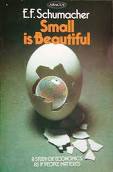
Small is Beautiful: Economics as if People Mattered
By E. F. Schumacher
Harper, 1989
The current state of human affairs, characterized by rising levels of joblessness, depleted natural resources and deep-rooted attitudes of indifference and powerlessness to do anything about it, would prove little surprise to E.F. Schumacher, author of Small is Beautiful: Economics as if People Mattered, a seminal text of ecological environmentalism first published in 1973. The book is a collection of essays that accurately predicts the consequences of Western consumption trends and offers a series of prescriptions, both in theory and in practice, to change our course.
Schumacher’s central thesis – that sustainability is unattainable as long as there is “no idea anywhere of enough being good and more-than-enough being evil” – makes evident the delicate natural limits that we all must honour. As we struggle with a recession that has imposed a downward adjustment on the scope of choices available to the average Canadian, Schumacher’s words provide a basis for rethinking our mantra of perpetual growth on a finite planet.
Through his academic though consistently readable essays, Schumacher examines the underlying dynamics of our relationships with technology, energy consumption and education, demonstrating that the size and scope of our institutions result in a dangerous disconnect between decision-maker and consequence. This leaves most of us blind to the moment-to-moment impact our every decision has on the health of our communities and the lives of our human and non-human neighbours.
If we are willing to overhaul our systems of organization by shifting power toward those on the lower levels of large organizations and encouraging decision-making at small-scale community levels, we can begin to unburden ourselves of the destructive tendencies of our late capitalist society. Doing so requires finding ways to better balance the social need for stability, the environmental need for restraint and the enterprising inclinations of free people.
It is in the very human experiences of compassion, dignity and creative spirit that Schumacher locates a sustainable human path. For instance, he challenges the blind pursuit of technological “advancement” and computerized systems when human-scale technology would better serve communities and provide opportunities to perform meaningful work.
Ultimately, Schumacher strikes a hopeful but cautious tone, reminding his readers that:
“It takes a good deal of courage to say ‘no’ to the fashions and fascinations of the age, to question the presuppositions of a civilization which appears destined to conquer the whole world; the requisite strength can be derived only from deep convictions. If it were derived from nothing more than fear of the future, it would be likely to disappear at the decisive moment.”
It is in taking ownership of our choices and enjoying proximity to those consequences that Schumacher locates sustainable alternatives. Small is Beautiful makes clear that the dynamic capacity of small communities to make human decisions is as strong and necessary today as ever.






